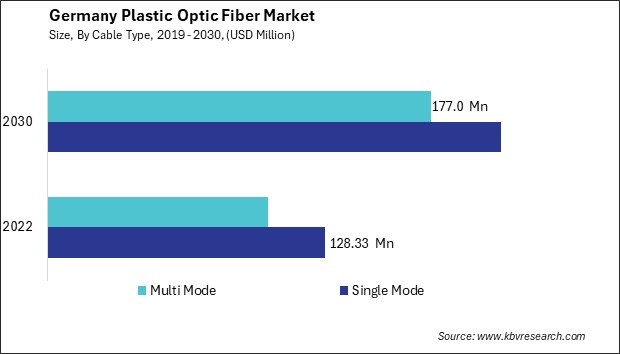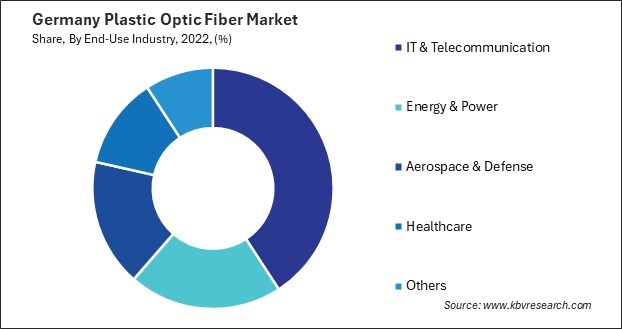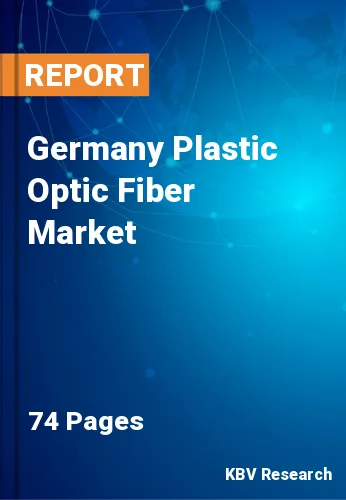The Germany Plastic Optic Fiber Market size is expected to reach $386.7 Million by 2030, rising at a market growth of 6.8% CAGR during the forecast period.
The plastic optic fiber market has seen significant growth and development in Germany in recent years. Fiber optics, particularly those made from plastic materials, have become integral components in various industries, including telecommunications, healthcare, automotive, and aerospace. The industry's expansion is attributed to several factors, including technological advancements, increasing demand for high-speed internet connectivity, and the growing adoption of fiber optic sensing solutions. The automotive industry is another key industry segment for plastic fiber optics in Germany. With the growing trend towards electric and autonomous vehicles, there is an increasing demand for advanced sensor systems and communication networks within vehicles.

Additionally, the increasing demand for high-speed internet services has fueled the deployment of fiber optic networks across Germany. With the rising popularity of bandwidth-intensive applications such as video streaming, online gaming, and cloud computing, there is a growing need for faster and more reliable internet connections. Moreover, the healthcare sector in Germany has emerged as a significant consumer of plastic fiber optic technologies. Fiber optic sensors and imaging systems are increasingly used in medical devices and equipment for minimally invasive surgery, endoscopy, and diagnostic imaging.
According to the International Trade Administration, the German medical device industry is one of the most lucrative healthcare industries worldwide, accounting for roughly USD 42 billion annually, or 25 % of the European industry total. As technology continues to evolve, one particular niche poised for expansion within this sector is Germany's plastic optic fiber market.
The COVID-19 pandemic has also significantly impacted the plastic optic fiber market in Germany. The sudden shift towards remote work, online education, and telemedicine has increased the demand for robust internet infrastructure, driving accelerated investments in fiber optic networks. Moreover, the pandemic has highlighted the importance of reliable and high-speed connectivity for maintaining business operations and facilitating remote communication and collaboration.
The plastic optic fiber market in Germany is witnessing a significant surge in adoption, primarily driven by the increasing integration of smart home devices. One of the key factors fueling the adoption of smart home devices in Germany is the growing emphasis on energy conservation and sustainability. Smart home systems equipped with plastic optic fiber (POF) technology enable homeowners to monitor and control their energy usage more efficiently, reducing waste and lowering utility bills. For instance, smart thermostats with POF automatically adjust temperature settings based on occupancy patterns and external weather conditions, optimizing energy consumption without sacrificing comfort.
Another significant driver of smart home adoption in Germany is the increasing focus on home security and surveillance. Smart security systems integrated with POF allow homeowners to monitor their property remotely in real time through connected cameras and sensors. These systems send instant alerts to the homeowner's smartphone in case of suspicious activity, providing peace of mind and enhancing overall safety.
Furthermore, the convenience and comfort offered by smart home technologies play a crucial role in driving consumer interest. From voice-activated assistants to automated lighting and entertainment systems, POF-enabled smart home devices empower users to streamline daily tasks and create personalized living environments tailored to German preferences. Thus, the surge in adopting plastic optic fiber technology in Germany's smart home industry is propelled by energy conservation, sustainability, home security, and comfort.
The plastic optic fiber market in Germany is experiencing a significant surge in demand driven by the country's growing emphasis on renewable energy sources. One of the key drivers behind this rising demand for renewable energy in the plastic optic fiber market is the growing awareness of the environmental impacts associated with traditional energy sources like fossil fuels. With concerns about climate change and air pollution on the rise, consumers and businesses have a growing consensus that renewable energy is the way forward.
According to the Umwelt Bundesamt, Germany has witnessed continuous growth in renewable energies, with their contribution to gross final energy consumption reaching 20.8% in 2022. The primary catalyst for this surge has been the electricity sector, where renewables have already accounted for an impressive 46.0% of total electricity consumption in the same year. As Germany aims to transition towards a more sustainable energy landscape, adopting renewable energy technologies has become paramount.
Moreover, government initiatives and policies promoting renewable energy adoption further bolstered the demand for plastic optic fiber (POF) in Germany. The German government has implemented ambitious renewable energy targets and incentivized companies to invest in clean energy technologies. This has created a conducive environment for the growth of the renewable energy sector, driving the demand for POF as a reliable and efficient means of transmitting data in renewable energy systems.
Additionally, advancements in POF technology have made it more cost-effective and efficient, further contributing to its growing popularity in renewable energy applications. POF offers numerous advantages over traditional copper-based cables, including higher bandwidth, immunity to electromagnetic interference, and easier installation. Therefore, the surge in demand for plastic optic fiber in Germany is fueled by the country's shift towards renewable energy, driven by environmental concerns, supportive government policies, and advancements in POF technology.

Germany's plastic optic fiber market is witnessing significant growth due to the increasing demand for high-speed data transmission, especially in automotive, industrial, and home networking applications. One prominent player in the German plastic optic fiber market is KDPOF GmbH, headquartered in Munich. KDPOF specializes in developing and producing innovative POF-based Gigabit Ethernet connectivity solutions. The company's products are widely used in automotive applications, such as in-vehicle networking systems, where high data transmission speeds and reliability are essential. KDPOF's expertise in plastic optic fiber (POF) technology has positioned it as a key player in enabling the transition to next-generation automotive networks.
Another notable company is Bayer AG, a global polymer materials and technology leader. Bayer produces specialty polymers suitable for POF applications, offering high optical clarity, mechanical strength, and resistance to environmental factors. These polymers are essential for manufacturing POF cables and components with excellent performance characteristics. Bayer's contributions to the plastic optic fiber market highlight the importance of advanced polymer materials in enabling high-speed optical communication.
Additionally, Lumberg Group, based in Schalksmühle, Germany, is actively producing POF-based connectivity solutions for industrial automation and networking applications. The company offers a wide range of POF cables, connectors, and assemblies designed to meet the demanding requirements of industrial environments. Lumberg's expertise in industrial connectivity, combined with its focus on POF technology, positions it as a key provider of reliable, high-performance solutions for industrial automation and control systems.
Moreover, LEONI AG, headquartered in Nuremberg, Germany, is a leading supplier of cables and cable systems, including POF solutions for various industries. The company's POF products are utilized in automotive, industrial, and communication applications, offering high bandwidth, electromagnetic immunity, and ease of installation. LEONI's comprehensive portfolio of POF cables and components caters to the diverse needs of customers seeking reliable and efficient optical communication solutions.
Furthermore, HUBER+SUHNER Polatis, based in Jena, Germany, is known for its expertise in optical switching technology. While not exclusively focused on plastic optic fiber, the company's optical switch solutions enable dynamic and flexible optical networks, including those utilizing POF for data transmission. HUBER+SUHNER Polatis' products are used in telecommunications, data centers, and research laboratories, contributing to the advancement of optical communication technologies. These companies play a vital role in driving innovation and expanding the application areas of POF-based solutions, contributing to the growth and evolution of the optical communication industry in Germany.
By Cable Type
By End-Use Industry
Our team of dedicated experts can provide you with attractive expansion opportunities for your business.

